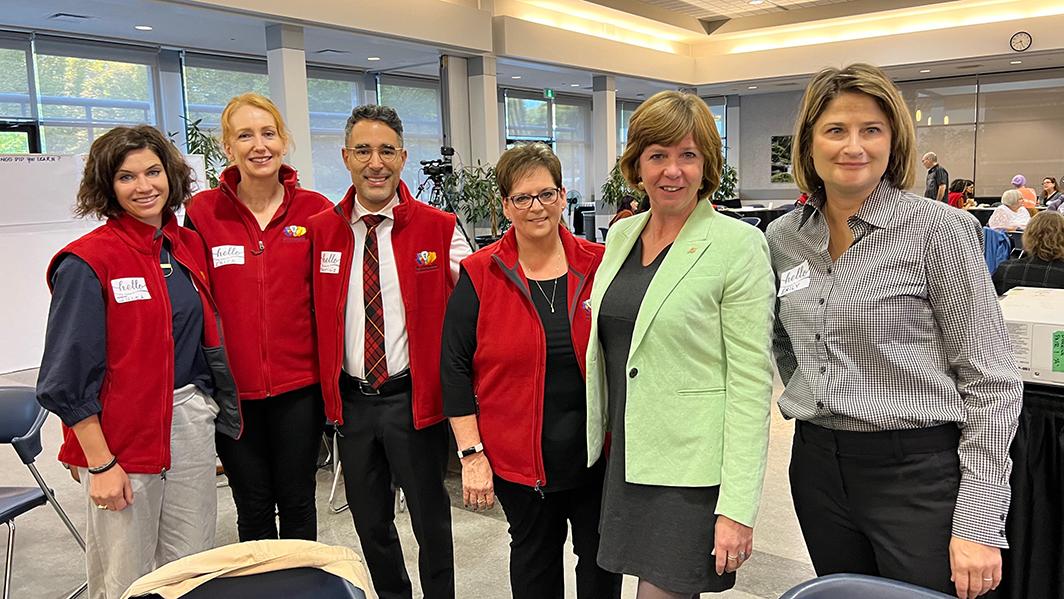BC Consensus Building Day
October 25, 2022

(L-R) Dr. Julia Schmidt (UBC), Dr. Erica Woodin (PSYC, UVic), Mauricio Garcia-Barrera (PSYC, UVic), Ms. Janelle Breese Biagioni (CGB Centre for Traumatic Life Losses), Minister Sheila Malcolmson (Ministry of Mental Health and Addictions), and Dr. Emily Haigh (PSYC, Uvic).
New funding and research will support people living with complex mental health and substance use issues and challenges in British Columbia.
UVic clinical psychologists, Mauricio Garcia-Barrera and Erica Woodin are lead investigators on the B.C. Consensus on Brain Injury, Mental Health, and Addictions project aimed to help people at a crossroads experiencing brain injury, mental health issues and addictions in British Columbia.
The three-year participatory action research project is a partnership between CGB Centre for Traumatic Life Losses, UVic and researcher, Julia Schmidt, University of British Columbia. Funding from the Ministry of Mental Health and Addictions ($345,000) and Vancouver Foundation ($225,000) will support three years of consensus building between healthcare providers, survivors and community stakeholders to find solutions to this crisis.
"Many community members in B.C. are undergoing a time of complex trauma—substance use, homelessness and mental health difficulties—often underlying these challenges is a brain injury,” says Associate Dean of Research Mauricio Garcia-Barrera.
“Individuals experiencing brain injury, mental health, addictions, homelessness and criminality, and their families, are struggling to navigate a system that is not fully integrated. This is leading to dire consequences for many,” says Janelle Breese Biagioni, clinical counsellor and CGB’s CEO and founder.
“Health care providers supporting individuals with mental health and addictions often speak of the difficulty of providing integrated and effective treatment services – a challenge even more pronounced when there is an underlying brain injury,” says UVic Associate Professor of Psychology Erica Woodin.
“This is an important venue to bring together stakeholders from public policy, health care, community members, researchers, and individuals with lived experience to discuss ways to bridge these gaps and better support individuals living with complex care needs,” says Woodin.
The first consensus building event on October 14 explored the issues, challenges and solutions of brain injury and the intersections of mental health and addiction, with a closer focus on overdose survival. Next June the event will continue exploring these intersections with a closer focus on intimate partner violence and brain injury, followed by the third event in 2024 on sports-related concussions and mental health, addictions and brain injury.
The events will be guided by an external facilitator and include round table discussions, presentations from experts, and invitations to vote on key priorities addressing mental health, substance use/addictions, and brain injury.
"We must take action now; our intention is the B.C. Consensus on Brain Injury, Mental Health, and Addictions project is an important step forward in determining priorities and solutions needed to bring about needed change to best serve people in British Columbia who are living with these experiences,” says Biagioni.
"To create consensus, we are implementing an innovative approach to gathering community stakeholders' perspectives, intentional and direct involvement of policymakers, cutting-edge digital technology and a range of knowledge mobilization tools,” adds Garcia-Barrera.
For more information:
Heads Together Think Tank – B.C. Consensus Building Days: https://headstogetherthinktank.com/
